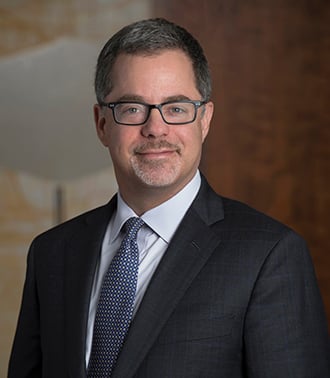What To Expect of EPA Enforcement Under Leadership of Pending Nominee Uhlmann
On June 22, 2021, the White House announced the nomination of highly regarded former DOJ Environmental Crimes Section Chief David Uhlmann for the top slot in EPA’s enforcement office --Assistant Administrator for Enforcement and Compliance Assurance (OECA). Uhlmann's nomination signals the Administration's intent to reinvigorate EPA's enforcement program. Key changes we expect to see under Uhlmann's leadership include increased emphasis on criminal prosecution of repetitive misconduct, a ramp-up in EPA investigations staffing, renewed use of supplemental environmental projects (SEPs) in enforcement settlements, and increased enforcement activity related to greenhouse gas emissions and climate change.
Currently the Director of the Environmental Law and Policy Program at the University of Michigan Law School, and faculty lead of the Environmental Crimes Project, Uhlmann is widely considered a leading authority on criminal prosecutions of environmental law violations. For more than a decade, he has focused his scholarship on the question: When should authorities pursue criminal enforcement of environmental violations?
In 2009, Uhlmann argued prosecutors should only pursue criminal charges of cases involving an aggravating factor (e.g. significant harm or risk of harm, deceptive conduct, facilities operating outside the regulatory system, and/or repetitive violations). Uhlmann suggested this approach to prosecutorial discretion would both alleviate concerns over overcriminalization and prosecutorial overreach and promote predictability. Uhlmann confirmed in 2014 and again in 2019, that prosecutors are for the most part already doing this -- and, according to Uhlmann, 98.7% of all defendants criminally charged between 2005-2014 committed violations involving one or more aggravating factors (and 76% with two or more).
While Uhlmann suggests EPA and DOJ pursue criminal prosecution in a predictable manner - and that environmental violations without an aggravating factor are not likely to result in criminal charges - Uhlmann also indicates that criminal prosecution of repetitive violations involving at least one additional aggravating factor will be an area of enforcement focus under his leadership. While Uhlmann's 2019 study shows that almost 75% of criminal defendants engaged in repetitive misconduct, and that over half of defendants engaged in repetitive, deceptive conduct, "the major new development," Uhlmann said, "is the surge in the percentage of defendants operating outside the regulatory system who engaged in repetitive misconduct." These are cases involving repetitive violations for failure to acquire permits, failure to monitor, failure to maintain records, or failure to report. Indeed, Uhlmann noted that while isolated incidents of operating outside the system may be better addressed by civil or administrative enforcement, criminal prosecution is easier to justify when misconduct occurs repeatedly, particularly when accompanied by other aggravating factors.
Uhlmann has been particularly outspoken and critical of enforcement trends under the Trump Administration, and we would anticipate that he will be attuned to measuring success under his own leadership by the same metrics. At an October 2020 American Bar Association event organized and moderated by Arnold & Porter attorneys, Uhlmann unveiled his latest study, concluding that during the first two years of the Trump Administration, prosecutions under the Clean Water Act declined by 70% from what they had been under President Obama, and Clean Air Act prosecutions dropped by more than 50%. Uhlmann stated that the low watermark of environmental enforcement - in 2018 with only 75 environmental prosecutions - was "unlike any decline that occurred across the 14 years of data analyzed" that this was a “dramatic departure from the non-partisan support for pollution prosecutions that had existed across administrations."
Officials at both DOJ and EPA responded to Uhlmann's analysis by defending their environmental enforcement records. Susan Bodine, head of OECA under the Trump Administration, asserted that “EPA has assessed more in civil penalties, criminal fines, and restitution since President Trump was inaugurated than the agency collected in the first four years of the prior administration ….” Jonathan Brightbill -- then-acting-head of DOJ's Environment and Natural Resources Division -- responded similarly.
As part of Uhlmann’s efforts to improve enforcement metrics, companies can expect a ramp-up in EPA staffing. In 2019, Uhlmann flagged that the decline in recent years in the number of EPA agents, and criminal investigators, directly corresponds with the decline in environmental investigations and prosecutions. Uhlmann highlighted that the EPA has had far less than the statutorily mandated 200 special agents nationwide, and that an increase in agent resources takes one to three years to produce an increase in prosecution levels. “[A] true commitment to strong criminal enforcement would require twice as many criminal investigators, if not more, so EPA could have a law enforcement presence in every state," says Uhlmann. Indeed, the Agency is already seeking to staff up, as reflected by EPA's FY 2022 budget request for increased funding to support investigations.
Consistent with the Biden Administration's stated priority for environmental justice (as previously discussed here), we anticipate Uhlmann will pay special attention to environmental violations with demonstrated impacts on minority and low-income communities that have a history of suffering disproportionately from pollution problems. And given his background, we would expect Uhlmann to work hand-in-glove with the civil and criminal enforcement branches of the Environment and Natural Resources Division at DOJ, as new leadership there hits the “reset” button on environmental enforcement policies and priorities, including the renewed use of supplemental environmental projects in enforcement settlements.
Most recently, Uhlmann has also highlighted urgency regarding the threat of climate change. Uhlmann sees “grassroots climate efforts and market forces converging even as climate disruption becomes a defining generational issue.” Sounding an optimistic note, he wrote that “we stand at the cusp of a resurgence in bipartisan support for the environment,” motivated by an increasingly commonly-held view that we are “perched on the precipice of environmental disaster, if we do not reduce GHG emissions drastically[.]” We expect Uhlmann to emphasize the role of enforcement in this area. As GHG regulations are developed, OECA will play an important role in shaping the regulatory landscape and techniques to ensure that new requirements are readily enforceable. As those regulations are implemented, in such areas as automotive GHG standards and methane emissions from oil and gas operations, OECA will be watching closely to hold the regulated community accountable.
The Senate Committee on Environment and Public Works will consider Uhlmann’s nomination at a hearing currently scheduled for September 15, 2021. We will be closely monitoring developments as his nomination proceeds through the Senate.
© Arnold & Porter Kaye Scholer LLP 2021 All Rights Reserved. This blog post is intended to be a general summary of the law and does not constitute legal advice. You should consult with counsel to determine applicable legal requirements in a specific fact situation.



